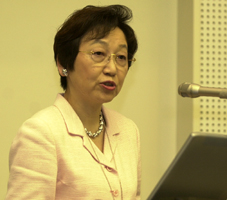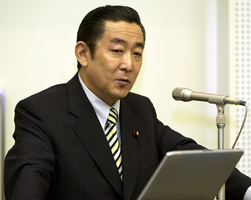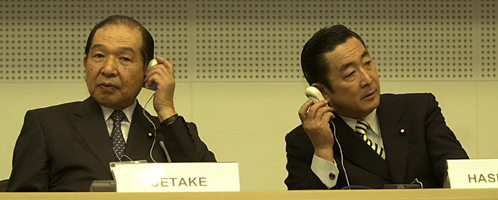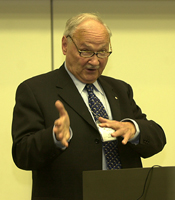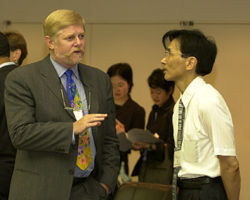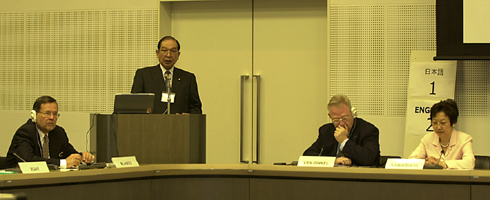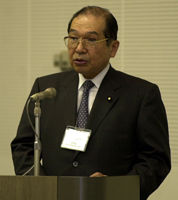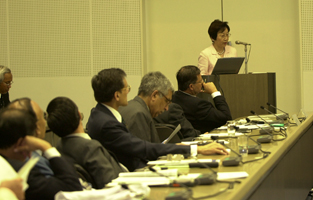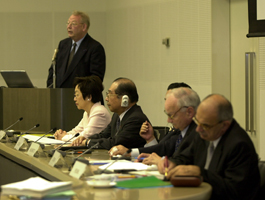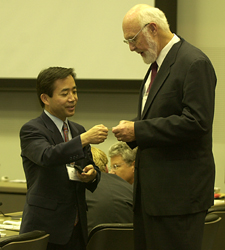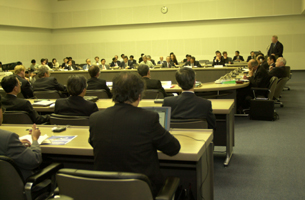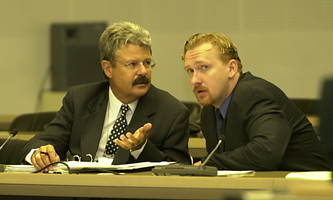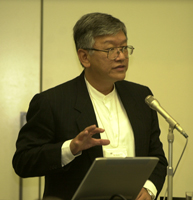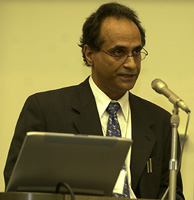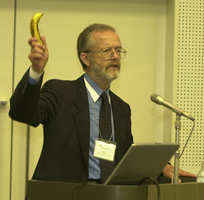|
Highlights
from Monday, 3 September
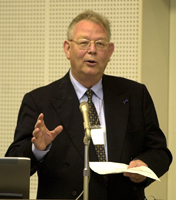 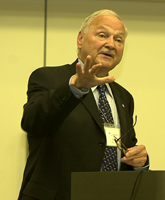 The
United Nations University (UNU), in cooperation with the Ministry of
Foreign Affairs, Japan, Ministry of the Environment, Japan, and Global
Legislators Organization for a Balanced Environment (GLOBE) International,
are the organizers of the World Summit for Sustainable Development (WSSD)
International Eminent Persons Meeting on Inter-Linkages - Bridging Problems
and Solutions to Work Towards Sustainable Development. The meeting is
being held at the UN House in Tokyo, Japan, on 3 and 4 September 2001.
The official website for the meeting is www.unu.edu/interlink.
Click
here for background documents. On Monday, conference participants
heard opening remarks from Hans van Ginkel, Rector, UNU (right
photo), Yoriko
Kawaguchi, Japanese Minister of the Environment, Shigeo Uetake,
Senior Vice-Minister for Foreign Affairs, Japan, and Ryutaro
Hashimoto, Chairman, GLOBE, Japan,
Former Japanese Prime Minister. Maurice Strong, President
of the Earth Council, University for Peace gave the key note address
(left photo). Participants then heard case study presentations
to to introduce the 3 working groups from Martin Kohr, Third
World Network, Samnotra Vijay, Head of Synergies and Interlinkages
Unit, UNEP, and Norman Myers, Honorary Visiting Fellow, Oxford
University. In the afternoon, the Working Groups convened: Working Group
1 on Linkages between Chapters of Agenda 21, chaired by Jan Pronk,
Dutch Minister of Housing, Spatial Planning and Environment; Working
Group 2 on Linkages between MEAs, chaired by Delmar Blasco, Secretary
General, Ramsar Convention; and Working Group 3 on Strategies for Sustainable
Development, chaired by Norman Myers,
Honorary Visiting Fellow, Oxford University. The
United Nations University (UNU), in cooperation with the Ministry of
Foreign Affairs, Japan, Ministry of the Environment, Japan, and Global
Legislators Organization for a Balanced Environment (GLOBE) International,
are the organizers of the World Summit for Sustainable Development (WSSD)
International Eminent Persons Meeting on Inter-Linkages - Bridging Problems
and Solutions to Work Towards Sustainable Development. The meeting is
being held at the UN House in Tokyo, Japan, on 3 and 4 September 2001.
The official website for the meeting is www.unu.edu/interlink.
Click
here for background documents. On Monday, conference participants
heard opening remarks from Hans van Ginkel, Rector, UNU (right
photo), Yoriko
Kawaguchi, Japanese Minister of the Environment, Shigeo Uetake,
Senior Vice-Minister for Foreign Affairs, Japan, and Ryutaro
Hashimoto, Chairman, GLOBE, Japan,
Former Japanese Prime Minister. Maurice Strong, President
of the Earth Council, University for Peace gave the key note address
(left photo). Participants then heard case study presentations
to to introduce the 3 working groups from Martin Kohr, Third
World Network, Samnotra Vijay, Head of Synergies and Interlinkages
Unit, UNEP, and Norman Myers, Honorary Visiting Fellow, Oxford
University. In the afternoon, the Working Groups convened: Working Group
1 on Linkages between Chapters of Agenda 21, chaired by Jan Pronk,
Dutch Minister of Housing, Spatial Planning and Environment; Working
Group 2 on Linkages between MEAs, chaired by Delmar Blasco, Secretary
General, Ramsar Convention; and Working Group 3 on Strategies for Sustainable
Development, chaired by Norman Myers,
Honorary Visiting Fellow, Oxford University.  Photo
above left: Maurice Strong gives the keynote address
Photo
above left: Maurice Strong gives the keynote address
 In his opening remarks, Hans van Ginkel, Rector, United Nations University
(above right), noted
that this meeting takes place at a critical stage and will contribute
concrete proposals for renewing the momentum and spirit of Rio. Noting
increased international environmental cooperation ever since the 1970s,
he underscored the need for coherence. He stressed that progress with
regard to fulfilling the goals of Agenda 21 has been unsatisfactory
and noted new challenges emerging, such as globalization and the HIV/AIDS
epidemic. He called for original contributions, new ideas and thinking
as well as practical proposals during this meeting.
In his opening remarks, Hans van Ginkel, Rector, United Nations University
(above right), noted
that this meeting takes place at a critical stage and will contribute
concrete proposals for renewing the momentum and spirit of Rio. Noting
increased international environmental cooperation ever since the 1970s,
he underscored the need for coherence. He stressed that progress with
regard to fulfilling the goals of Agenda 21 has been unsatisfactory
and noted new challenges emerging, such as globalization and the HIV/AIDS
epidemic. He called for original contributions, new ideas and thinking
as well as practical proposals during this meeting.
(Click
here for photos from the Working Groups)
|


